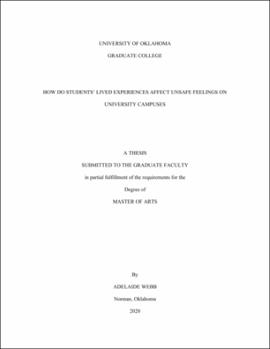| dc.description.abstract | The purpose of this study is to explore the lived experience of safety, or lack thereof, for students on a university campus. This study utilizes a hermeneutic phenomenological approach of qualitative research design. Six participants were interviewed to understand what influences their perception of safety and to what extent aspects of their identity, media sources, or university policies contributed to those ideas. By examining where ideas surrounding safety originate from, we can gain information about the individual impact of perceived threats and their response as well as the role a university plays in addressing those needs. Utilizing the interpretive-descriptive approach in analyzing participant responses, the lived experience of safety was categorized by two themes. These themes incorporated van Manen’s (2014) existential methods which are universal as everyone experiences the world through their relations to others, bodily response, and perception of space, time, and things. The lived experience of safety for the college students interviewed is one of vulnerability and prevention seeking. Aspects of identity such as gender, ethnicity, and sexual orientation influenced participants’ perception that they were more exposed to specific threats that targeted their identity. Participants also reported feeling more vulnerable to threat due to their perceived absence of a physical presence from the university in support of their safety. Participants perceiving they were without university support focused more on individual prevention seeking behaviors to ensure their safety needs were met. Implications for university administration are to continue to communicate with their student population about their needs on campus and whether policies enacted address their concerns. Future research could replicate the study with more participants to continue to understand the lived experience of safety as this study does not seek to provide absolutes to the issue of safety on campus. Research could also explore the lived experience with more participants who are undergraduates, LGBTQ, minorities, or immigrants on a student visa to gain a deeper breadth of knowledge on the diverse populations that come to college. | en_US |
